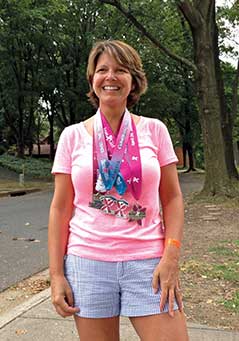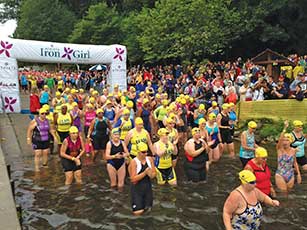IRON WOMEN
MEET THREE WOMEN WHO CONQUERED THE ODDS
TO COMPLETE AN ICONIC RACE
STORY BY HOLLY SMITH PHOTOGRAPHY BY ANDRÉ CHUNG
Though she’s been active most of her life, Diana Toronto, a Columbia real estate agent never dreamed of 
mother of three school-age kids had something to prove — mostly to herself.
“As strong as I like to think I am,” she says, the surgery, chemotherapy and radiation she went through at the time was challenging. “It knocked me down really, really hard,” she recalls of the six-month regimen that left her bald, exhausted and vulnerable to infections. Yet soon after treatment ended, Toronto, now in remission, began exercising in earnest once again. Before long, she felt pulled toward the Athleta Iron Girl Columbia Triathlon.
Which makes sense. The largest event of its kind in the world, the all-female Iron Girl Columbia is more than a grueling physical challenge. For thousands of women – including those like Toronto, who face daunting challenges of their own – it’s an affirmation.
A RACE IS BORN
Launched in 2004, the Iron Girl brand — “created by women for women” — comprises a series of triathlons,
half-marathons and other events around the country. Locally, the popular Iron Girl Columbia is one of many competitions hosted by the Columbia Triathlon Association (a.k.a. TriColumbia), an endurance event
production company started three decades ago when a group of Howard County athletes decided to stage the first-ever Columbia Triathlon.
Since then, the nonprofit TriColumbia — which donates its proceeds to dozens of charities, including the Howard County Arts Council and Police Explorers — has expanded its offerings to include the Celebrating Heroes Triathlon, the Kidz Triathlon and numerous other events. It’s the Iron Girl Columbia (and its sister competition, the Iron Girl Rocky Gap Triathlon), though, that seems especially meaningful to so many
When Sibol, now 25, entered Centennial Lake for the swimming leg of 2013’s Iron Girl Columbia in Ellicott City, it was the first time she’d swum anywhere but a pool since a training incident a year prior nearly took her life. In June 2012, while practicing an open-water swim with her mother in the Bird River, Sibol was struck by a power boat. Her left side was crushed.
“I spent about a month at Maryland Shock Trauma,” recalls Sibol, who suffered a severed artery and ulnar nerve, as well as a shattered pelvis and shoulder. “After that, I went to an inpatient rehab center for a week and then moved back home to my parents’ rancher,” where she could better navigate the wheelchair she was confined to for two months.
Multiple surgeries, hours of physical therapy and endless emotional support from friends and family later, Sibol had made a remarkable physical recovery. And while she was grateful to have regained near complete use of her left arm and shoulder, the competitive young woman also felt cheated.
“I had put so much effort [into training for the 2012 Iron Girl Columbia] before my accident, but I was stopped short,” says Sibol, who now has permanent steel pins and plates in her pelvis, left arm, and ribs. “It was depressing. I wanted to finish what I started.” A little over a year after almost being killed by the speeding boat, she did. “They said I’d never be 100 percent again,” she adds. “But, you know, they said I couldn’t do a lot of things I’m doing now.”
A SINGULAR EXPERIENCE
So what is it about the Iron Girl Columbia that prompted “Competitor” magazine to declare it the “Best Women’s Event” in the mid-Atlantic region? It can’t be the 0.62-mile swim, the 16-mile bike ride or the 3.4-mile run; plenty of all-female triathlons feature similar distances.
It’s not the finishers’ medallions, commemorative T-shirts, or post-race snacks and live music. Heck, it isn’t even the complimentary massages awaiting exhausted athletes when they complete the course. It’s, well … it’s hard to explain. There’s just something about Iron Girl events. “When you cross the finish line and theysay, ‘You are an Iron Girl,’ it’s very emotional,” says Barb Van Winkle, 60, tearing up at the memory of the many Iron Girls she’s completed. “It’s an incredible experience; you never forget it.”
Something else Van Winkle, president of Nancy Adams Personnel in Columbia and a triathlete since her mid-40s, will never forget is an incident in the summer of 2012 that forced the mother of three grown sons to wonder whether her running — let alone competing in a triathlon — days were over.
While swimming near a waterfall following a whitewater rafting trip, Van Winkle was urged to jump from the banks as others were doing. Unfortunately, “I jumped just a little too far out to the right, and my foot went straight down into a rock,” says the lifelong athlete, emphasizing the vertical drop with her hands. “I broke in the middle of my foot, right at the base, my second, third and fourth metatarsals.”
After months of recovery spent first on a scooter, then on crutches and finally a cane, Van Winkle recounts the day in February 2013 that “I said the words, ‘I’m going out for a run.’ I’ll always remember how powerful that was to say, because I’d thought I may never run again.”
Chuckling that her maiden voyage lasted maybe three minutes — “I was just thrilled to be out and moving my body” — Van Winkle conquered the Iron Girl Rocky Gap only 15 months after her potentially crippling accident. She finished th
ATMOSPHERE OF ENCOURAGEMENT
If there’s one word that best describes events like the Iron Girl Columbia, it’s supportive. From start to finish, an atmosphere of camaraderie fills the course. It’s not that the women competing don’t want to win. It’s that they want everybody to win.
“It feels like everyone is there for a reason, even if the reason is just the power of being a woman,” says Whitney Sibol, who now works at Maryland Shock Trauma as a special projects coordinator. “The spirit is amazing, and even though I was honored before the 2013 race [with Athleta’s Power to the She award for having overcome major obstacles], there were so many people running for larger reasons, and I felt mine was so inadequate.”
Diana Toronto, the Columbia realtor, has been cheered on by her reasons — her husband and kids — as she crossed the finish line at every Iron Girl Columbia since 2009, raising money (as part of Team CONQUER Cancer) for the Claudia Mayer/ Tina Broccolino Cancer Resource Center at Howard County General Hospital each time.
Although one goal is to set a good example for her family, Toronto says she became an Iron Girl for herself, too. “I think I was really out to prove to myself that I was still the same strong, motivated person I always was, that I wasn’t going to let cancer change me,” says Toronto, who completed the “triple crown” — the Iron Girl Half Marathon, Iron Girl Rocky Gap, and Iron Girl Columbia — last year.
“Being an Iron Girl for all these consecutive years post-cancer has made me believe in myself more,” she continues. “I do this because I can.”
Learn more about the Athleta Iron Girl Columbia Triathlon and TriColumbia’s other events at tricolumbia.org. And visit tinyurl.com/oplpqcf to watch the TEDx talk Whitney Sibol gave about her devastating accident and recovery. *




